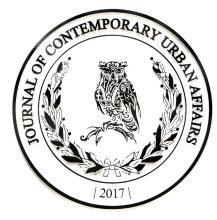Resource information
In todays highly regulated cities a conspicuous pattern of marginal open space has emerged between buildings and streets With rapid population growth different activities are also emerging in the open spaces particularly in the cities of developing countries This study explores the informal use of the marginal open spaces along residential streets in IleIfe Nigeria to identify the physical planning implications The data for this study were mainly collected through a questionnaire survey and open space measurements Findings established that the major activities in the open space were necessary earning income sociocultural and leisure pursuits Landuse problem occurrence index LPOI showed that the significant challenges associated with the use of the space were an increase in travel time to destinations LPOI 433 open space littering LPOI 417 traffic and pedestrian congestion LPOI 417 and degradation of aesthetics LPOI 399 It is therefore concluded that the use of marginal open space has both positive and negative effects on the residential environments of the Nigerian city The study adds to the body of knowledge in urban studies by empirically investigating the physical planning implications of the everyday use of marginal open space in a developing country


